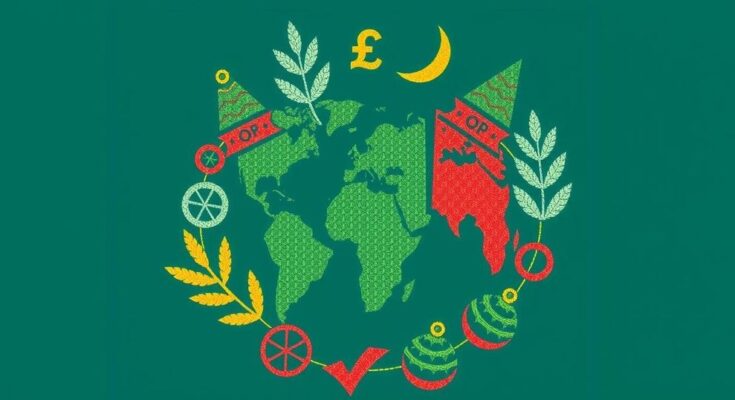The COP29 climate negotiations in Baku have extended past their deadline, as rich countries offer insufficient funds for climate action, prompting developing nations to demand more support. Disagreements over funding strategies have led to tensions, with some vulnerable nations walking out of discussions. Key stakeholders emphasize the need for transformative financial commitments to address urgent climate crises effectively.
Negotiations regarding a proposed $1 trillion global climate fund extended late into Saturday night, highlighting discord between affluent and developing nations. Wealthy countries, including the UK and US, suggested providing $300 billion of the required $1.3 trillion annually, prompting outcries from poorer nations who insisted such funding was insufficient and detrimental to their financial stability. Ali Mohamed, Kenya’s climate change envoy, argued that at least $600 billion should come as grants or low-interest loans from developed nations, stating, “Anything lower than that will not help the world tackle climate change.”
As tensions escalated in Baku, Azerbaijan, with a two-week UN climate conference originally set to conclude on Friday, poorer nations expressed their dissatisfaction by walking out of critical negotiations. Mohamed Adow, director of Power Shift Africa, lamented the failure of wealthier nations to meet their climatic financial commitments, asserting that vulnerable countries had left due to unfulfilled promises. UK Energy Secretary Ed Miliband remained committed to negotiating, emphasizing, “I’ve always said there is a will to get a deal.”
Saudi Arabia faced widespread criticism for allegedly obstructing negotiations, while Azerbaijan, the host nation and a significant oil producer, was also denounced for potentially favoring fossil fuel allies. Germany’s foreign minister, Annalena Baerbock, accused Azerbaijan of jeopardizing vulnerable states, stating, “We will not allow the most vulnerable to be ripped off by the few rich fossil-fuel emitters.” If key negotiations to reaffirm a transition away from fossil fuels were postponed, it would provoke frustration among many countries.
The United States and China, typically influential at the Conference of the Parties (COP), maintained a low profile during the discussions. While the US contingent remains from President Biden’s administration, the possible Republican shift under Donald Trump looms over their involvement. China has indicated its willingness to contribute voluntarily to climate finance for poorer nations, contrasting with the obligatory contributions from wealthier countries.
Despite the challenging circumstances, some delegates remained cautiously optimistic as negotiations continued late into the night. Harjeet Singh, global engagement director for the Fossil Fuel Non-Proliferation Treaty Initiative, reinforced the need for substantial financial support, stressing that “the deal must deliver a transformative scale of finance that prioritises the urgent needs of communities bearing the brunt of the escalating climate crisis.”
The ongoing discussions at the COP29 conference in Baku, Azerbaijan, center around the establishment of a comprehensive climate fund aimed at addressing the escalating climate crisis. This effort is underscored by a significant disparity between the funding commitments of developed and developing nations, highlighting the broader issues of climate justice and equitable financial responsibility. Negotiators are grappling over the specifics of funding mechanisms, with developing countries advocating for grants and low-interest loans, while wealthier nations are hesitant to commit adequate resources, prompting tensions that threaten the negotiation process.
The COP29 negotiations in Baku reveal a critical junction in global climate finance talks, with significant disagreements between developed and developing nations regarding funding allocations. As poorer nations call for increased financial support, particularly through grants rather than loans, the urgency to address the climate crisis has become abundantly clear. With protests initiated by vulnerable nations against insufficient commitments from wealthier counterparts, it remains vital for all parties to collaboratively reach an agreement that champions equity and justice in climate action.
Original Source: www.theguardian.com




